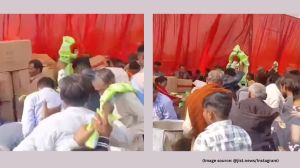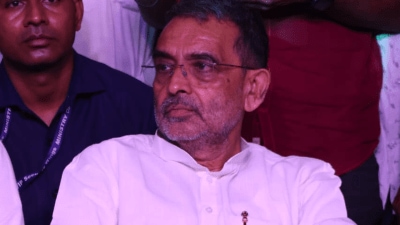‘Better to have become a Naxal and surrendered’: In Maharashtra’s Gadchiroli, survivors of Maoist violence seek answers
Survivors of Maoist violence in Gadchiroli district demand justice as they await long-promised government benefits.
 Hundreds of Gadchiroli families affected by Maoist violence say they still await jobs, compensation, and rehabilitation, despite official promises. (Express Photo by Partha Paul)
Hundreds of Gadchiroli families affected by Maoist violence say they still await jobs, compensation, and rehabilitation, despite official promises. (Express Photo by Partha Paul)Rajesh Atram* lost his brother to the Maoists. In 2015, his brother, just 25 years old, was working as a Special Police Officer (SPO), providing information about Maoist movements to the Maharashtra Police. “Gheun gele tyala ani gaavat aanun golya zaadlya (They abducted him, brought him back to the village, and then shot him dead),” Atram recalls.
Now, as he hears about the government’s surrender and rehabilitation benefits to Maoists who renounce violence and join the mainstream, Atram voices his grim assessment. “Jyanni maarle, tyanna nyay bhetun rahila, ani je maran paavle, tyanchya sobat anyay hun rahila (Those who killed are receiving justice, while injustice is being done to those who died). It would have been better if my brother had become a Naxalite and later surrendered,” he says.
Atram is just one among the hundreds of overlooked victims of Maoist violence in Maharashtra’s Gadchiroli district, which witnessed large-scale Maoist surrenders as the government’s fight against Left Wing Extremism gains ground. Those who have suffered from Naxal violence here say they are trapped today. They can neither return to their villages nor access the government schemes meant to support them.
‘Why should we give information now?’
The decline in the number of active Maoists has also created another casualty in Gadchiroli—the 350-odd SPOs in the district, many of whom have not received payments for months now.
Nikhilesh Gedam*, 42, who hails from a remote village bordering Chhattisgarh, was kidnapped along with the sarpanch of his village in 2012 on suspicion of being a police informer. “They made us walk around the jungle for four days, tied us and then finally held a Jan Adalat (people’s court). This helped them decide whether I was innocent or not. They then killed the sarpanch and let me go,” says Gedam.
Scared, Gedam left his village and came to Gadchiroli, where he began working as an SPO. “I was afraid of the Naxals, and so I never went back to my village. Then I came in contact with the Gadchiroli police, and they made me an SPO in 2013,” he says.
“My job was to give confidential information which I received from my village, meaning, if Naxals were seen in my village, or if I got any sensitive details about the meetings or anything, I would inform the police,” he adds.
Gedam says he used to get paid regularly—from Rs 3,000 initially to Rs 6,000 and Rs 10,000 recently. But, in May, the payments stopped, allegedly without any message. “I went to the office and asked. They said I was removed because Naxal numbers have gone down and there are no funds from the government,” Gedam, who now works as a daily wage worker in Gadchiroli city, says.
He has still not visited his village due to the fear of getting killed. “All SPOs know each other. We are all friends, so we spoke among each other and figured out that over 400 of us are jobless,” says Gedam. “Many of us did work for the police. Some facilitated surrenders, some helped with encounters. These people cannot go back and live in their own villages now,” he explains.
Gedam facilitated four surrenders for the police in 2018 and 2019.
Talking to The Indian Express, he says, “My village is on the Chhattisgarh border, so the movement of Maoists from that side is always observed. There is a village nearby; a friend of mine told me that 22 people (Maoists) had come there wearing uniforms just 10 days ago.”
When asked if he had informed the police, he says, “They used to pay us specifically for confidential information. If they have stopped the money, why should we give the information?”
A senior police officer told The Indian Express that Maharashtra initially had a quota of 1,200 SPOs approved by the Centre under the Security Related Expenditure (SRE) scheme. “Seeing the changed LWE scenario, a review was done by a high-level committee in January 2025, which reduced the allocated quota of SPOs from 1,200 to 700 for the entire state, in which Gadchiroli’s allocated SPOs were reduced to 600 by the end of April 25,” he said. “In light of the above, approximately 350 SPOs were reduced from rolls with proper information to them with effect from June 2025,” he added.
‘Naxal Pidit’ and ‘Naxal Grasta’
People affected due to Maoist violence in Maharashtra get a certificate, stating that they are ‘Naxal Pidit’ or a victim of Naxal violence, which can be used by the beneficiaries to obtain a Class 3 or 4 (group C or D) government job.
People in Gadchiroli classify people affected due to violence as ‘Naxal Pidit’—those whose family member or members were killed by Maoists—and ‘Naxal Grasta’ or (Naxal-affected—those who were threatened by Maoists and forced to flee their villages and homes or were abducted by Maoists and later released.
According to official data accessed through an RTI query by The Indian Express, between 2015 to September 10, 2025, 329 people, including Maoists, police personnel and civilians, were killed in Maoist-linked violence in Gadchiroli. In a decade, 107 civilians were killed. A total compensation of over Rs 7.73 crore was provided to the families of the deceased in Gadchiroli.
According to official records, the Gadchiroli police have recruited 69 people from families of Maoist victims as police constables. But the benefits have not reached everyone.
‘To this day, we have not received anything’
Dinesh Masram* was not even born when his uncle was killed by a Maoist. “My uncle was killed on the pretext of being a police informer in 2000. I was born later, the same year. He was in Class 12 when he was killed. Since he was unmarried and did not have any immediate family, I was named as a beneficiary. But, to this day, our family has not received anything from the government. We did not receive any money back then either,” says Masram.
“They (police) only called my family members two or three times to Gadchiroli. When I was a kid, they took me on a trip to Mumbai. Since then, I have been receiving notices, but have not received any actual benefits,” he adds.
Masram was recently called to the collector’s office for a job opportunity, but the result is still pending.
Talking to The Indian Express, Gadchiroli Collector Avishyant Panda said that people affected due to Maoist violence do not fall under the minimum qualification criteria. “We have revived 29 Class 4 posts as a part of Chief Minister Devendra Fadnavis’s 150-day programme and are giving them appointment orders for the same,” Panda said.
“There are a total of 229 people affected due to Naxals. Jobs have already been given to 154, and the status for over 75 is still pending. During the 150-day programme, we took special permission for 29 posts, and we will give actual orders after the election,” Panda added.
‘All benefits exist on paper’
‘Naxal Pidit’ Pravin Ramteke* has been trying to get a government job for a while now. “We went to the collector’s office on Monday, filed our application and came back. We could not meet the collector. There is indeed a provision for a job for one member of a Naxal-affected family; I have been trying for this for a long time,” he says.
“There is a specific GR (Government Resolution) stating that one person from the family must be given a job. It is the collector’s responsibility to assign the job based on our educational qualifications, but there is a significant delay now,” he adds.
Ramteke says there are about 500 victims of Maoist violence in the district. “My father was killed in 2002 in Aheri on suspicion of being a police informer. I was very young then, just around 5 or 6 years old,” he says.
“Many of us have left our villages and are living outside. The government actually has a rehabilitation scheme for us. They are supposed to provide land, and there are provisions for the education of our kids. Everything exists on paper, but none of us have received the benefits. We neither got land nor a house. It has been 25 years since my father was killed, yet we have not received any help,” says Ramteke.
“Our people died for the administration, yet today we lack even the basic facilities. Meanwhile, the Maoists who are surrendering are being provided with every facility,” he adds.
Harsh Masram* is also upset about the benefits being promised to Maoists who surrender. “They are getting everything. They said they would give us jobs, but there is no sign of these jobs. All of us are facing the worst injustice,” he says, adding that his father was shot and critically injured by Maoists.
“At that time, we received medical expenses and just Rs 12,000. That’s it. Since earlier times, he used to work on a daily wage at the police station. Later, they made him an SPO, so he started getting a regular salary, first Rs 3,000, then Rs 6,000, and later Rs 10,000. But about four months ago, they fired 400 people without telling them anything,” says Masram. “They risked their lives when it was dangerous, and now they are discarded,” he adds.
‘Only 20 out of 100 get benefits’
Vijay Prakash Gupta of Chhattisgarh NGO Jan Seva Sangathan says that only 20 out of every 100 people affected by Maoist violence receive the benefits listed by the government. Gupta has held protests in several parts of the country, including New Delhi, to fight for the rights of such victims.
“The government claims they provide scheme benefits to Naxal-victim families, but in reality, out of 100, they give it to 20 and leave the other 80 behind. There is a technical difference between ‘Naxal victim’ (pidit) and ‘Naxal-affected’ (grasta), but when certificates are issued, everyone receives a ‘Naxal-victim’ certificate. The situation is the same in both Chhattisgarh and Maharashtra,” he says.
“It is arbitrary—those who get it, get it; those who don’t, don’t. Those who ran from pillar to post finally got everything. Whoever raised their voice, just to shut them up, the government handed them the benefits, selectively,” Gupta adds.
Questioning the discrimination, he says, “Naxal victims are supposed to receive funds from both the central and state governments, but very often, some receive aid only from one source. They claim they are providing rehabilitation, but no one is seeing any actual benefit,” he says.
Atram can relate. “My brother was working as an informant; he sacrificed his life for the government, didn’t he? Shouldn’t we get the recognition that a martyr’s family gets?” he asks.
* The names of those affected due to Maoist violence in Maharashtra’s Gadchiroli district have been changed to protect the privacy and safety of the individuals interviewed.







